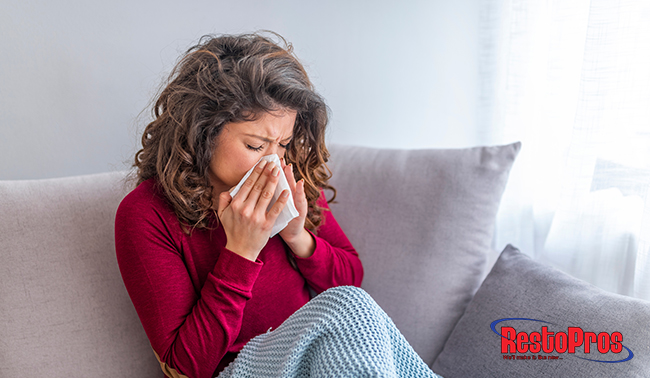
Have you recently been experiencing watery eyes or a slightly stuffy nose? Resist the urge to look these symptoms up on WebMD because you’ll only scare yourself. Instead, you might want to inspect your house for mold—your body could be reacting to it. Mold is a type of fungus that grows particularly in areas with excess moisture and spreads via microscopic spores, sometimes ending up indoors. It can be a nuisance in addition to being harmful to your health, especially if you are susceptible to allergies. We know this all sounds a little worrying but if you do your research and take the proper precautions, you will be fine. For your knowledge and safety, the professionals at RestoPros have created a quick guide on how to avoid health problems caused by mold.
Worsening of Asthma
21 percent of the current asthma cases in the United States are attributed to dampness and mold in the home. Mold spores inhaled by people with asthma can cause the airways in the lungs to constrict and produce more mucus. Reactions to this can include shortness of breath, wheezing, and coughing.
How to Avoid It
While asthma is a life-long disease, one of the ways you can manage it is by limiting your exposure to certain things that might trigger your asthma, such as mold spores. Some ways you can do this:
- Use DIY mold cleaning products in your bathroom, kitchen or other areas prone to mold. It’s a great alternative to products containing bleach that can be toxic for your health and can trigger asthma in some people. You can mix baking soda or vinegar with water to create non-toxic, asthma friendly, mold cleaners. When buying asthma friendly products, look for the green seal of approval on products.
- Include exhaust fans in your home to ensure proper ventilation.
- Use a dehumidifier or humidity monitor that indicates humidity levels in the home. Be sure to keep humidity levels below 50 percent.
- It’s difficult to avoid mold spores outside but try to stay away from areas where mold counts are high such as parks and gardens. If you must be outside, wear an allergy mask.
- Skin Irritations
While there is a weak link between exposure to mold and excessive skin irritation, some organizations such as the Center for Disease Control and Prevention still consider skin irritation as a symptom of exposure to mold, albeit a less common one.
How to Avoid It
- According to the American Academy of Dermatology, outdoor allergens such as pollen and mold spores could trigger Eczema in some children who already have it. If your child’s Eczema flares up when outdoor mold counts are high, try to limit their time outdoors. Also, keep your child off the lawn a couple of hours after it has been mowed.
- Antihistamines are good for symptoms of allergy such as sneezing and itching. Zyrtec and Benadryl are some of the most common antihistamines taken to reduce allergy symptoms. You can also try applying calamine lotion to relieve any skin irritation. Read all the directions before you take any medications and consult your doctor or pharmacist if you have any concerns.
- Take an oatmeal bath! Sure, it might be a little messy but it’s good for relieving irritated skin. You can either take the DIY route by making your own oatmeal powder, or you can purchase Oatmeal bath treatment kits from a pharmacy.
- Sinusitis or Sinus Infection
Inhaling allergens can lead to the inflammation of the sinuses leading to a sinus infection. Signs of this condition are nasal stuffiness, sinus headaches and fever. A more serious version of this is allergic fungal sinusitis, which is the swelling of the sinuses after fungus comes into contact with the sinuses. Some people with allergic fungal sinusitis might need surgery to remove fungal debris from the sinuses.
How to Avoid It
- Do saline rinses to keep your sinuses clean. You can purchase saline solutions from your local pharmacy or make your own saline solution.
- Stay away from sugary foods– fungus feeds on sugars. Try this anti-fungal diet instead.
- Stay hydrated by drinking lots of fluids.
- Eat fish oil tablets to strengthen your immune system.
- Hypersensitivity Pneumonitis
Hypersensitivity pneumonitis is a condition caused by an allergic reaction to certain dusts you inhale, leading to the inflammation of the lungs. It is also called Farmer’s Lung as it is common amongst farmers and cattle workers who breathe in allergens from mold on hay. There is also something known as mold-induced hypersensitivity pneumonitis, which can be caused by contaminated humidifiers and ventilation and even areas with water damage. Symptoms of hypersensitivity pneumonitis include chest tightness, dry cough, shortness of breath and chills.
How to Avoid It
- Thoroughly clean out your ventilation systems.
- Make it a goal to be active for 30 minutes a day. Go for a jog, a brisk walk or take the stairs instead of the elevator. Exercising can help your metabolism and increase the efficiency of oxygen transportation in your body.
- Eat foods that are known to reduce inflammation. Some examples are green tea, turmeric, leafy greens and blue berries.
These might be great preventative solutions, the best way to avoid health problems caused by mold is by removing exposure to the mold. If you think your house might have a mold problem call RestoPros at 855-587-3786 or schedule an appointment on our website. With years of experience and a dedicated team, we’ll make sure your home is mold-free.
